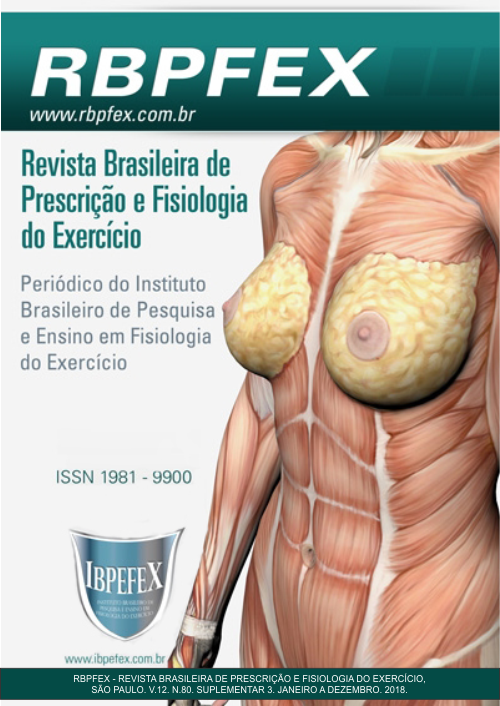Level of satisfaction with the body image of musculation practicing women
Abstract
Currently, relationships with the body are largely influenced by various sociocultural, psychological and other factors. Thus, beauty standards and satisfaction with body image have been widely discussed mainly for female subjects. Dissatisfaction with body image is one of the reasons that women of different age groups enter into bodybuilding gyms in order to improve their physical appearance. The objective of this study is to verify the level of satisfaction with the body image of women practicing bodybuilding. A questionnaire was used with questions related to their body image. The results showed that 60% of the women who participated in the study had no body image dissatisfaction, 20% mild dissatisfaction and 15% moderate dissatisfaction. It is believed that the practice of bodybuilding exerts influence on satisfaction with body image.
References
-Bôas, M. S. V.; e colaboradores. Nível de satisfação com a imagem corporal e a aparência muscular de praticantes de musculação. Revista da Educação Física/UEM. Maringá. Vol. 21. Núm. 3. p. 493-502. 2010.
-Chinarelli. J.; e colaboradores. Insatisfação Corporal e Comportamento Alimentar em frequentadores de academia. Revista Saúde e Pesquisa. Vol. 5. Núm. 2. p. 280-287. 2012.
-Coelho.; e colaboradores. Avaliação da satisfação da imagem corporal de mulheres praticantes de musculação. Anais do Congresso de Imagem Corporal. Universidade Federal de Juiz de Fora. 2011.
-Damasceno, V.; e colaboradores. Imagem corporal e corpo ideal. Revista Brasileira de Ciência e Movimento. Vol. 14. Núm. 2. p. 81-94. 2006.
-Gomes. C.; e colaboradores. Relação da imagem corporal e idade com variáveis antropométricas em mulheres praticantes de musculação em uma academia de ginástica do município de Cacoal-RO. Coleção Pesquisa em Educação Física. Vol. 13. Núm. 3. 2014.
-Groesz, L. M., Levine, M. P.; Murnen, S. K. The effect of experimental presentation of thin media images on body satisfaction. International Journal of Eating Disorders. Vol. 31. Num. 2. 2002. p. 1-15.
-Lessa.; e colaboradores. Quando as mulheres invadem as salas de musculação: aspectos biossociais da musculação e da nutrição para mulheres. Iniciação Científica Cesumar. Vol. 9. Núm. 2. p. 109-117. 2007.
-Pessoa, V. O. Insatisfação corporal e as influências dos meios de comunicação face à aparência, controle do peso e obesidade. Dissertação de Mestrado em Psicologia. Universidade Lusofona de Humanidades e Tecnologias. 2010.
-Russo, R. Imgem Corporal através da cultura do belo. Movimento & Percepção. Espírito Santo de Pinhal. Vol. 5. Núm. 6. 2005.
-Santos, N. L. S.; Ferreira, A. S.; Triani, F. S.; Silva, C. A. F. Concepção da imagem corporal sob influência do condicionamento físico em praticantes de corrida de rua. Revista Brasileira de Prescrição e Fisiologia do Exercício. São Paulo. Vol. 11. Num. 70. 2017. p. 826-833. Disponível em: <http://www.rbpfex.com.br/index.php/rbpfex/article/view/1282>
-Sousa, M. V. Imagem Corporal de mulheres praticantes de musculação. EDeportes.com. Revista Digital, Buenos Aires. Ano 18. Núm. 186. 2013.
-Vilhena, L.; ecolaboradores. Avaliação da imagem corporal em professores de educação física atuantes no fitness na cidade do rio de janeiro. Revista Brasileira de Ciências do Esporte. Vol. 34. Núm. 2. p. 449-464. 2012.
Authors who publish in this journal agree to the following terms:
- Authors retain the copyright and grant the journal the right of first publication, with work simultaneously licensed under the Creative Commons Attribution License BY-NC which allows the sharing of the work with acknowledgment of the authorship of the work and initial publication in this journal.
- Authors are authorized to enter into additional contracts separately for non-exclusive distribution of the version of the work published in this journal (eg, publishing in institutional repository or book chapter), with acknowledgment of authorship and initial publication in this journal.
- Authors are allowed and encouraged to post and distribute their work online (eg, in institutional repositories or on their personal page) at any point before or during the editorial process, as this can bring about productive change as well as increase impact and impact. citation of published work (See The Effect of Free Access).






